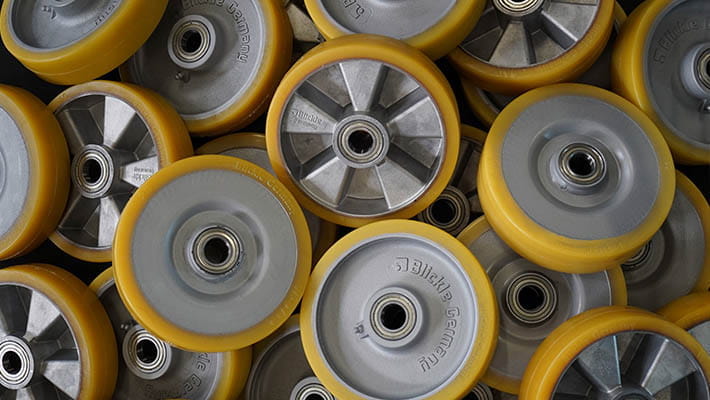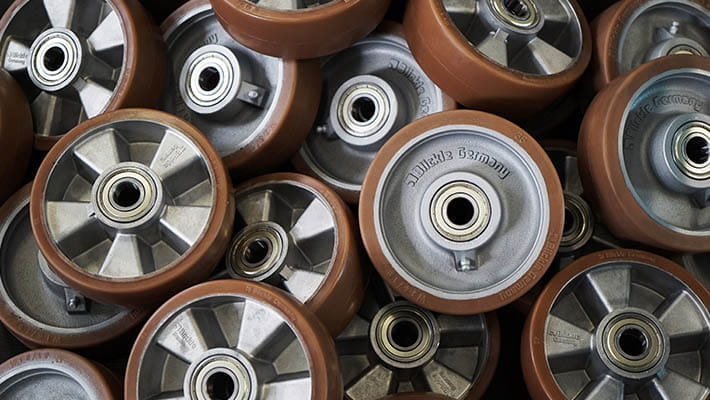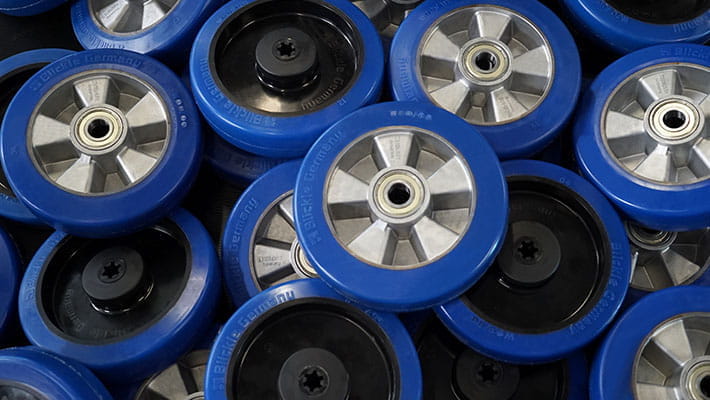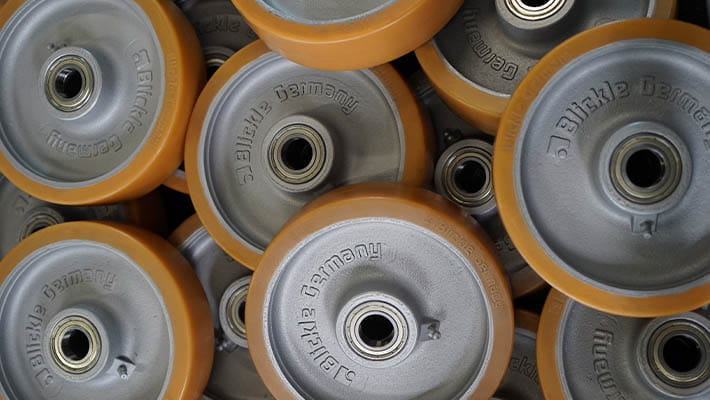PU wheels and PU castors – abrasion resistant and durable
The right PU tread for every requirement you have. Extrathane®, Softhane®, Besthane®, Besthane® Soft, Vulkollan®
Blickle has developed four different polyurethane types, tailor-made for different applications. Comprehensive expertise from decades of experience has been put into the Extrathane®, Softhane®, Besthane® and Besthane® Soft treads. This range is complemented by wheels made out of the equally high-quality polyurethane material Vulkollan®. This selection means that Blickle’s standard range has the right solution for almost any application. Special polyurethanes for high dynamic and mechanical loads as well as conductive and optimised rolling resistance versions round out the product range. All treads have a consistently high quality level, wear-resistance and resilience.
Polyurethane product range:
- Load wheels, drive wheels, swivel and fixed castors, heavy duty casters, guide rollers, wheels for stackers, rollers for pallet trucks and spring-loaded castors
- The tread of polyurethane wheels is made from reaction-injected polyurethane elastomer with a hardness level of 75 to 92 ± 3 Shore A
- PU wheels in different sizes from 25 to 1,000 millimetres in diameter
- Heavy duty polyurethane wheels with load capacities up to 100 tons per wheel
PU wheels materials – overview of treads
- hard reaction-injected polyurethane elastomer based on polyesterpolyol, diisocyanate and diol
- provides a number of different benefits (e.g. high load capacity, floor surface preservation, operational comfort), making it suitable for a variety of applications
- low rolling resistance
- resistant to a wide range of aggressive substances, with the exception of hot water or hot air with a high humidity level
- antistatic version available
- main applications: Intralogistics, machine and systems engineering, mobile devices and equipment
- soft reaction-injected polyurethane elastomer based on polyesterpolyol, diisocyanate and diol
- extra-thick and elastic tread
- excellent floor surface preservation and smooth rolling performance
- low rolling resistance
- resistant to a wide range of aggressive substances, with the exception of hot water or hot air with a high humidity level
- antistatic version available
- main applications: Intralogistics, mobile devices and equipment
- hard reaction-injected polyurethane elastomer based on polyetherpolyol, diisocyanate and diol
- very low rolling resistance and easy manoeuvrability
- high dynamic load capacity
- hydrolysis resistant and resistant to many aggressive substances
- main applications: Driverless transport systems, conveyor technology, machine and systems engineering, hygiene
- soft reaction-injected polyurethane elastomer based on polyetherpolyol, diisocyanate and diol
- extra-thick, elastic tread
- sexcellent floor surface preservation and smooth rolling performance
- very low rolling resistance
- high dynamic load capacity
- hhydrolysis resistant and resistant to many aggressive substances
- main applications: Intralogistics, driverless transport systems, conveyor technology, machine and systems engineering, hygiene
- hard reaction-injected polyurethane elastomer based on polyesterpolyol, diisocyanate and diol
- low rolling resistance
- high dynamic load capacity
- resistant to a wide range of aggressive substances, with the exception of hot water or hot, humid air
- main applications: Driverless transport systems, conveyor technology, machine and systems engineering
What are PU wheels used for?
Polyurethane wheels are used in a wide range of applications due to their excellent properties such as durability, toughness, and resistance to abrasion, chemicals, and weathering.
Poly wheels are a popular choice for various industries due to their durability, strength, and versatility. They are an excellent choice for applications that require high-performance wheels that can withstand heavy loads, abrasion, and harsh environments.
The benefits of PU wheels in industrial settings
Polyurethane wheels offer numerous benefits in industrial settings. These wheels are highly durable, resistant to wear and tear, and provide excellent grip and stability, making them ideal for use in heavy-duty machinery and equipment. Polyurethane casters also provide superior shock absorption, reducing the impact of vibrations on both the equipment and the operator. With their excellent performance and durability, polyurethane wheels are a smart choice for any industrial setting.
Are PU wheels good for outdoor use?
The answer is yes - Polyurethane wheels are an excellent choice for outdoor use due to their durability and resistance to weather conditions. They can handle a variety of terrains and offer a smooth ride. Overall, if you're looking for reliable and high-performing wheels for your outdoor activities, polyurethane wheels are a great choice.
PU wheels or rubber wheels?
Overall, the choice between polyurethane and rubber wheels depends on the specific needs of the application. If durability and load capacity are top priorities, then polyurethane casters may be the better choice. If a softer ride and better traction on smooth surfaces are more important, then rubber wheels may be the way to go.
Are PU wheels soft?
Poly wheels can be both soft and hard, depending on the durometer of the material used. Polyurethane casters can be made in a range of durometers, from very soft to very hard. A softer durometer may be more suitable for indoor applications, while a harder durometer may be better for outdoor use or heavier loads.
How to clean PU wheels?
Polyurethane wheels and casters can be cleaned with various cleaners such as benzine, machine cleaner, or even isopropanol (very small amounts).
Do PU wheels mark the floor?
Polyurethane casters are typically non-marking, which means they won't leave scuffs or scratches on the floor, making them suitable for use on sensitive flooring surfaces This is because the material used in polyurethane wheels is formulated to be softer than the floors they come into contact with.
Polyurethane material: Facts & figures at a glance.
| Polyurethane material |  Blickle Extrathane® |
 Blickle Softhane® |
 Blickle Besthane® |
 Blickle Besthane® Soft |
 Vulkollan |
||||
|---|---|---|---|---|---|---|---|---|---|
| Technical data | |||||||||
| Hardness | 92 Shore A | 75 Shore A |
92 Shore A |
75 Shore A |
92 Shore A |
||||
| Abrasion resistance | 40 mm3 | 45 mm3 | 40 mm3 | 50 mm3 | 40 mm3 | ||||
| Rebound resilience | 42 % | 57 % | 65 % | 75 % | 52 % | ||||
| Rolling resistance | 0,9 % | 1,0 % | 0,7 % | 0,8 % | 0,9 % | ||||
| Tensile strength | 48 N/mm2 | 44 N/mm2 | 46 N/mm2 | 40 N/mm2 | 50 N/mm2 | ||||
| Breaking elongation | 510 % | 520 % | 650 % | 700 % | 615 % | ||||
| Maximum speed | 16 km/h | 16 km/h | 25 km/h | 25 km/h | 25 km/h | ||||
| Application | |||||||||
| High loads |
■ ■ ■ |
■ ■ |
■ ■ ■ |
■ ■ |
■ ■ ■ |
||||
| Dynamic load capacity (high load at high speed)
|
■ ■ |
■ ■ |
■ ■ ■ |
■ ■ |
■ ■ ■ |
||||
| Continuous use |
■ ■ |
■ ■ |
■ ■ ■ |
■ ■ ■ |
■ ■ ■ |
||||
| Operational comfort/floor surface preservation |
■ ■ |
■ ■ ■ |
■ ■ |
■ ■ ■ |
■ ■ |
||||
| Long immobile periods under heavy loads (see compression set) |
■ ■ |
■ ■ |
■ ■ ■ |
■ ■ ■ |
■ ■ |
||||
| Flexibility at low temperatures |
■ |
■ |
■ ■ |
■ ■ |
■ |
||||
| Resistance to chemical substances and UV radiation |
■ ■ ■ |
■ ■ ■ |
■ ■ ■ |
■ ■ ■ |
■ ■ |
||||
| Hydrolysis resistance | – | – | ✔ | ✔ | – | ||||
| Antistatic versions | ✔ | ✔ | – | – | – | ||||
|
■ ■ ■ very good |
■ ■ good |
■ limited |
✔ yes | – no |
Our expertise: polyurethane research and development
The formula of the polyurethane material and how it is processed are the main factors affecting the quality of the end product. They have a significant impact on tread and tyre hardness, rebound resilience, abrasion resistance, load capacity, rolling resistance and low-temperature flexibility. That’s why Blickle has really got to grips with the material polyurethane. Our developers use the latest methods and keep close relationships with established scientific institutions to improve existing formulas and designs every day and keep our ideas moving. In addition to the properties of different polyurethane elastomers, the manner in which they adhere to the wheel centre also plays a significant role in the quality of the product. That’s why Blickle puts wheels and their treads through extensive testing as early as the development phase. This guarantees a consistently high level of quality. In addition to using cutting edge techniques like linear and non-linear FEM, Blickle’s engineers have a wide variety of test equipment in their laboratories. That is just one of the reasons why Blickle was the first German wheel and castor manufacturer to be DIN EN ISO 9001 certified in the year 1994.
Find more information about our production.






































